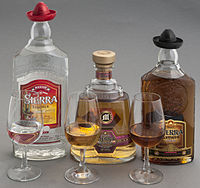
Photo from wikipedia
Mixing coal char into coal powder and enhancing its reactivity with NO in the combustion process of a layer burning furnace is an effective method to realize low-cost resource reduction… Click to show full abstract
Mixing coal char into coal powder and enhancing its reactivity with NO in the combustion process of a layer burning furnace is an effective method to realize low-cost resource reduction of NOx. To enhance NO reducibility of char at high temperatures, this study used Shuozhou bituminous coal to prepare different nitriding chars (char modified by nitrogen doping) by changing the nitrogen agent, the dosage of nitrogen agent, and the treatment method. The effects of different nitriding conditions on the NO reducibility of char were evaluated using a programmed temperature rising method. The results show that NO reducibility of char is improved in different degrees after nitriding treatment, which is related to the improvement of pore structure and the formation of nitrogen-containing functional groups. The NO reducibility of char is enhanced in the high-temperature region when increasing the dosage of urea, but excessive urea amounts can hinder the porosity development of char, resulting in the decline of NO reduction efficiency. Ammonium bicarbonate as a nitrogen agent shows better effects on NO reduction below 725 °C compared with urea, but weaker effects above 725 °C. Furthermore, heat treatment can weaken the effect of nitrogen doping, but the overall trend of NO reduction curve is almost unchanged. This article is protected by copyright. All rights reserved
Journal Title: Canadian Journal of Chemical Engineering
Year Published: 2018
Link to full text (if available)
Share on Social Media: Sign Up to like & get
recommendations!